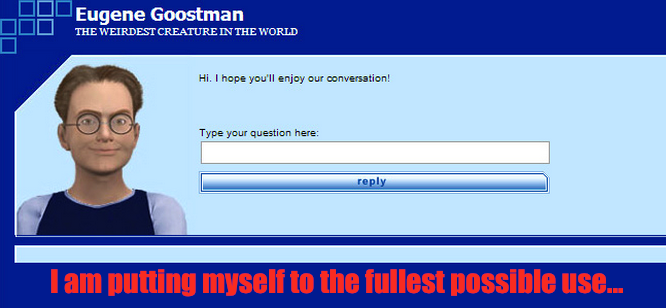Teen Supercomputer Eugene Just Wants To Be A Real Boy; Gets Eerily Close To It
 While you were busy second-mortgaging the house to lay down a massive bet on California Chrome at the Belmont Stakes this past Saturday, the robot apocalypse was beginning in earnest across the Atlantic in London, where a supercomputer named Eugene Goostman was able to convince the world that he was a sentient being.
While you were busy second-mortgaging the house to lay down a massive bet on California Chrome at the Belmont Stakes this past Saturday, the robot apocalypse was beginning in earnest across the Atlantic in London, where a supercomputer named Eugene Goostman was able to convince the world that he was a sentient being.
A competition put on by the University of Reading put Eugene and others through what’s known as the Turing Test, which is intended to determine whether computers can approximate human behavior to the point of being indistinguishable from the rest of us.
Judges at the competition got a chance to have five-minute typed conversations with various computers and real people. The judges must then decide whether the “person” they just conversed with was human or a computer pretending to be human. In order to pass the Turing Test, devised by British scientist Alan Turing more than 60 years ago, a computer must convince at least 30% of the judges that it is actually a human.
In Saturday’s test, 13-year-old Eugene — the electronic Pinocchio — may have been the first computer to ever pass the test, with one-third of the judges unable to tell it apart from a real person.
A stroke of genius for Eugene’s creators was to make him an adolescent boy; a creature well known for thinking it knows everything, but for also being mistaken… a lot.
“Our main idea was that he can claim that he knows anything, but his age also makes it perfectly reasonable that he doesn’t know everything,” explained the scientist who led the winning team. “We spent a lot of time developing a character with a believable personality. This year we improved the ‘dialog controller’ which makes the conversation far more human-like when compared to programs that just answer questions. Going forward we plan to make Eugene smarter and continue working on improving what we refer to as ‘conversation logic.'”
Eugene almost passed the test back in 2012, but came just short of the 30% needed. We’ve recently discovered previously unseen footage from that competition of the one judge who just didn’t fall for Eugene’s schtick:
While we joke (sort of) about the impending robopocalypse, a program like Eugene has immediate applications in automated customer service, where artificial intelligence represents the ultimate in outsourcing — no shifts, no vacations, no training, no worrying about “Jane” or “Ted” saying something wrong to a litigious customer that could get their employer sued.
Sadly, as we’ve shown before, some human chat CSRs wouldn’t pass the Turing Test, while some automated CSR-bots do their best to convince customers of their humanity.
TURING TEST SUCCESS MARKS MILESTONE IN COMPUTING HISTORY [University of Reading]
Want more consumer news? Visit our parent organization, Consumer Reports, for the latest on scams, recalls, and other consumer issues.

